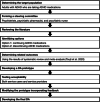Decision aid development and its acceptability among adults with attention-deficit/hyperactivity disorders regarding treatment discontinuation after remission
- PMID: 38868662
- PMCID: PMC11114424
- DOI: 10.1002/pcn5.57
Decision aid development and its acceptability among adults with attention-deficit/hyperactivity disorders regarding treatment discontinuation after remission
Abstract
Aim: Current clinical guidelines for attention-deficit/hyperactivity disorder (ADHD) put shared decision making (SDM) at the center of care. However, there remain challenges in SDM in ADHD management, particularly regarding the decision to continue or discontinue medication after ADHD remission in adult patients. We aimed to develop a decision aid (DA) for adult patients with ADHD regarding the continuation or discontinuation of their ongoing ADHD medications after they have attained remission.
Method: We systematically developed a DA according to the International Patient Decision Aid Standard (IPDAS). First, we created a DA prototype using the results of our previous systematic review and meta-analysis that identified the consequences of continuing and discontinuing ADHD medications. Second, we administered a mixed-method questionnaire (alpha acceptability testing) to adult patients with ADHD and healthcare providers to improve the DA prototype and develop it into a final version that is acceptable for clinical settings.
Results: Our DA consisted of ADHD description, the option to continue or discontinue ADHD medications, the advantages and disadvantages of the consequences, as well as value clarification exercises for each option. Patients (n = 20) reported that the DA had acceptable language (85%), adequate information (75%), and a well-balanced presentation (53%). Healthcare providers (n = 19) provided favorable feedback. The final DA met all six IPDAS requisite criteria.
Conclusions: Our results could facilitate the SDM process between patients and healthcare providers on the continuation or discontinuation of ADHD medication following remission. Further studies should verify the effects of using the DA during the SDM process among patients across the age spectrum with ADHD and healthcare providers.
Keywords: attention‐deficit/hyperactivity disorder; decision aid; shared decision making.
© 2022 The Authors. Psychiatry and Clinical Neurosciences Reports published by John Wiley & Sons Australia, Ltd on behalf of Japanese Society of Psychiatry and Neurology.
Conflict of interest statement
The authors declare no conflicts of interest.
Figures


Similar articles
-
Development and acceptability of a decision aid for major depressive disorder considering discontinuation of antidepressant treatment after remission.Neuropsychopharmacol Rep. 2022 Sep;42(3):306-314. doi: 10.1002/npr2.12269. Epub 2022 Jul 1. Neuropsychopharmacol Rep. 2022. PMID: 35775506 Free PMC article.
-
Development and field testing of a decision aid to facilitate shared decision making for adults newly diagnosed with attention-deficit hyperactivity disorder.Health Expect. 2022 Feb;25(1):366-373. doi: 10.1111/hex.13393. Epub 2021 Dec 2. Health Expect. 2022. PMID: 34856044 Free PMC article.
-
Development and acceptability testing of a decision aid for considering whether to reduce antipsychotics in individuals with stable schizophrenia.Neuropsychopharmacol Rep. 2023 Sep;43(3):391-402. doi: 10.1002/npr2.12366. Epub 2023 Jul 14. Neuropsychopharmacol Rep. 2023. PMID: 37452456 Free PMC article.
-
Development and acceptability of a decision aid for chronic insomnia considering discontinuation of benzodiazepine hypnotics.Neuropsychopharmacol Rep. 2022 Mar;42(1):10-20. doi: 10.1002/npr2.12219. Epub 2021 Nov 22. Neuropsychopharmacol Rep. 2022. PMID: 34807524 Free PMC article. Review.
-
Effect of Continuing and Discontinuing Medications on Quality of Life After Symptomatic Remission in Attention-Deficit/Hyperactivity Disorder: A Systematic Review and Meta-Analysis.J Clin Psychiatry. 2020 Mar 24;81(3):19r13015. doi: 10.4088/JCP.19r13015. J Clin Psychiatry. 2020. PMID: 32237294
References
-
- American Psychiatric Association . (2013). Diagnostic and statistical manual of mental disorders fifth edition (DSM‐5) Washington, DC: American Psychiatric Pub Incorporated.
-
- Faraone SV, Asherson P, Banaschewski T, Biederman J, Buitelaar JK, Ramos‐Quiroga JA, et al. Attention‐deficit/hyperactivity disorder. Nat Rev Dis Primers. 2015;1:15020. - PubMed
-
- Cortese S. Pharmacologic treatment of attention deficit‐hyperactivity disorder. N Engl J Med. 2020;383:1050–56. - PubMed
LinkOut - more resources
Full Text Sources
Miscellaneous
